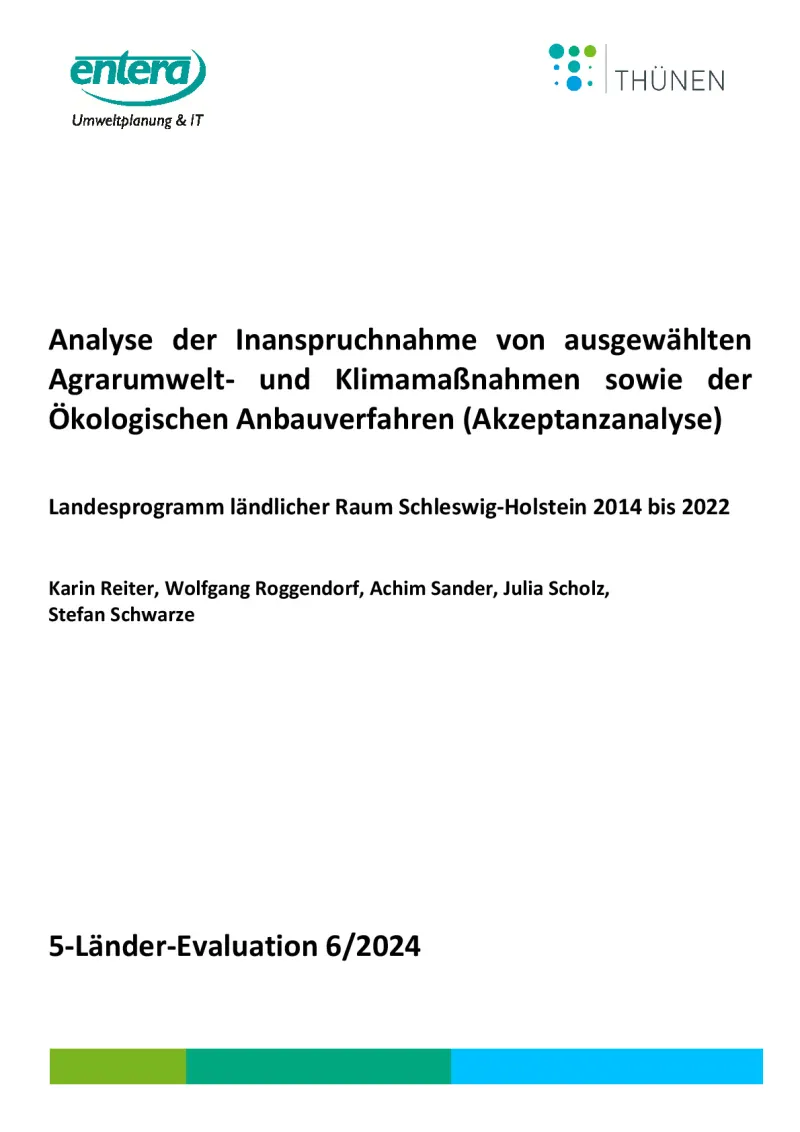Analysis of the use of selected agri-environmental and climate measures and organic farming methods
The report focuses on the acceptance of area-based agri-environmental and climate measures as well as the promotion of organic farming practices.
- Germany
- 2014-2022
- Environmental impacts

The report focuses on the acceptance of area-based agri-environmental and climate measures (German: AUKM) as well as the promotion of organic farming practices by the Schleswig-Holstein State Programme for Rural Areas from 2014 to 2022.
The first chapters outline the financial inputs and funding volumes for the entire portfolio of agri-environmental and climate measures, as well as organic farming methods. On the one hand, in-depth considerations were made for measures that had a larger scope of obligations. These are the agri-environmental and climate measures, funding offers for diverse crops in arable farming (German: VKA), winter greening (German: WB), and the introduction and maintenance of organic farming methods (German: ÖKO). On the other hand, in the case of contractual nature conservation, the analyses focused on the contract model for small-scale farming in arable farming (German: VNS KTA). The analysis includes participant-non-participant comparisons, location and region-specific evaluations, sector-related analyses and time series analyses.
The first chapters show financial inputs and funding scopes for the entire portfolio of agri-environmental measures (AECM) and organic farming methods. The following, more in-depth considerations are carried out for the measures with larger commitment scopes. These issues enable corresponding data stratification and include participant/non-participant comparisons, location- and region-specific evaluations, farm sector-related analyses and time series progressions.
With the exception of low-emission and water-friendly application of manure, the measures addressed are: a) crop diversification, b) winter cover crops, c) small-scale arable farming as a contract model for contractual nature conservation and d) support for the introduction and maintenance of organic farming methods.
An overall view of the AECM and organic farming methods shows a significant increase in the area supported and the number of participants between 2015 and 2021. This is due, on the one hand, to the increasing use of contractual nature conservation measures, particularly in the case of contract models in arable farming and grassland farming on peatland sites. On the other hand, organic farming methods contributed to this development, with an increase of almost 80% in their subsidised area.
In net terms, the share of arable land and organic farming methods in the total area of agricultural land in Schleswig-Holstein almost doubled (physical area), from 6% in 2015 to just under 12% in 2020.
Author(s)
Karin Reiter, Wolfgang Roggendorf, Achim Sander, Julia Scholz, Stefan Schwarze